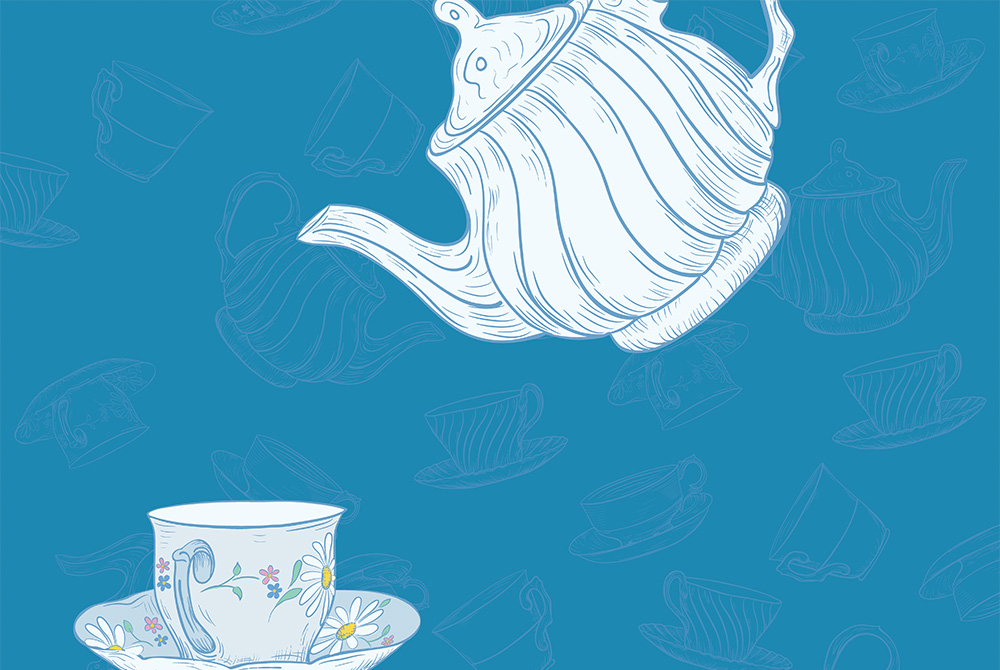Put the kettle on as Local food historian Dr Sue Bailey explores our love affair with tea and coffee, including the discovery of an ’18th-century Starbucks’ in Cambridge city centre
Does coffee or tea seduce or stimulate you? Personally, it takes nothing less than a double espresso to propel me into action. No self-respecting coffee roaster or barista these days would dare serve what The Women’s Petition Against Coffee in 1674 described as “nasty, bitter stinking, nauseous Puddle-water” – and you can celebrate how far we’ve come on National Tea Day on 21 April and during National Coffee Week (29 April-5 May).
But how best to stimulate the brain with caffeine? “A drip method,” according to Craig Jackson at Coffee World, a well-established Milton-based roastery which has a retail shop and supplies many Cambridge cafes. “Or a double expresso shot, as the caffeine has longer to develop in the brewing process.”
If you want space to work, hold a meeting or park the buggy (plus excellent coffee) visit Stir in Chesterton, or Espresso Library on East Road: a hip cafe where they use the highest-quality brewing methods and organic dairy and plant-based milks.
But which came first as our national beverage – coffee or tea? Imported from South America in the 16th century, it was coffee that first enticed us, spreading as both a fashionable and social drink. By the mid-17th century, there were many thousands of coffee houses. The Cambridge Archaeological Unit recently uncovered Clapham’s coffee house opposite St John’s College. “Ruins of an ‘18th century Starbucks’, including coffee cups, animal bones and 38 teapots were found in a disused cellar,” says researcher, Craig Cessford.
Coffee houses were popular with men, where newspapers were first available and debate flowed. Two 18th-century coffee houses in Cambridge were the Greek’s and the Turk’s Head, last appearing in the mid 70s as a Berni Inn steakhouse, with the historic facade still in existence on Trinity Street.
Sociability is also key at today’s independent cafes. The laidback Indigo Coffee House in St Edward’s Passage is a favourite, as is the on-trend Bould Brothers on Round Church Street, whose vision is not just to have the best coffee, but “to create the experience of a luxury minibreak,” says co-founder, Max Bould. “It’s our mission to use that cup to help put a smile on people’s faces.”
Tea did not become the national drink until the mid-18th century. Surprisingly, the first tea shipments saw it being used as a medicine rather than a refreshing drink. Initially it was prohibitively expensive – in fact, by 1660 it was taxed and locked away in special boxes called tea caddies, but since then it has become progressively less costly and more popularly consumed.
In Cambridge, although historic cafe The Whim on Trinity Street closed in the early 1980s and Auntie’s Tea Shop is now replaced by The Senate bar and bistro, Samovar Tea House in Ely carries the caddy forward. Co-owner Lizzy Doe says: “We stock over 140 teas and prioritise sourcing ethical and healthy ingredients for our tea blends such as Autumn River, inspired by the smell of woodsmoke from the narrowboats.”
Also creating new cafe history is Tim Hayward who, with his wife, reincarnated the 90-year-old Fitzbillies cafe and bakery. Fitzbillies, according to Tim, is as close now as it ever will be to its Edwardian original. It’s been a seven-year process, and the “half a million hot cross buns we are currently going ape making” will be the perfect accompaniment to a cup of tea.
The tea could be provided by Simon Fraser of Hot Numbers Coffee, who has recently taken on The Kandula Tea Company and is offering tea tasting out at his new coffee roastery base (which you can find out more about on page 66).
Feminist Dora Russell, an early student at Girton College, implied that tea could be a seductive invitation to more than just a beverage. Even after the first world war, female students had to have a college chaperone if they received a tea invitation from a young man. I’m sure she would approve that tea and coffee houses are now for everyone, and you can meet friends or even start a flirtation by sharing a table.
Simon says: “We want our Kandula Teas to be enjoyed as everyday teas, because although not every day is the same, every day should be special.”
The same goes for a coffee day, too – so let’s enjoy.
Dr Sue Bailey is a food historian and food scientist, plus a regular presenter on Flavour, Cambridge 105 Radio’s fortnightly food show

